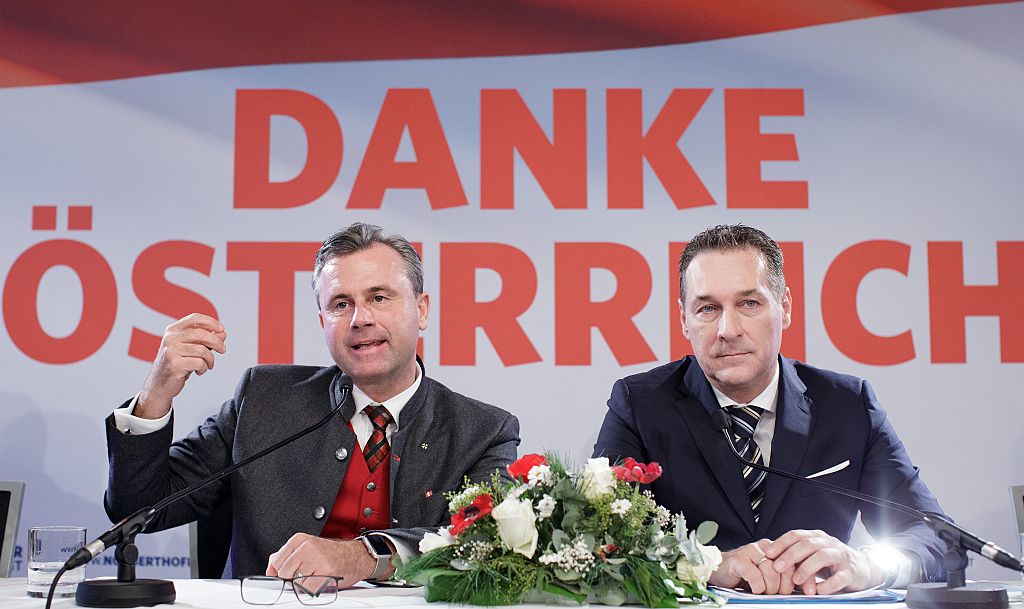Austria's Freedom Party casually mentions it met with Trump's national security adviser before signing pact with Moscow


A free daily email with the biggest news stories of the day – and the best features from TheWeek.com
You are now subscribed
Your newsletter sign-up was successful
On Monday, the leaders of Austria's far-right Freedom Party traveled to Moscow and signed a "working agreement" with Russia's ruling United Russia party. In announcing the pact, Freedom Party leader Heinz-Christian Strache mentioned that he also met with retired Lt. Gen. Michael Flynn, Donald Trump's designated national security adviser, in Trump Tower a few weeks ago. "Internationally, the Freedom Party continues to gain in influence," he wrote. Norbert Hofer, the Freedom Party candidate who recently lost his bid for Austria's presidency, traveled to Moscow with Strache.
The Freedom Party, founded by ex-Nazis in the 1950s, is one of several far-right, anti-immigrant parties gaining popularity throughout Europe. After signing the cooperative agreement, Strache offered to act as "a neutral and reliable intermediary and partner" between the incoming Trump administration and the Kremlin. Sergei Zheleznyak, the United Russia official who signed the pact for Moscow alongside Pyotr Tolstoy, the party's deputy chairman in the lower house of parliament, suggested Europe's "migration crisis" as a point of cooperation, while Strache said on Facebook that another goal would be "to get rid of the sanctions that damage the economy and are in the end useless."
Zheleznyak is barred from traveling to the U.S. under 2014 sanctions America and Europe levied against Russia for seizing Ukraine's Crimean peninsula. Trump is widely expected to drop the sanctions once he gets into office, and he and some key advisers and Cabinet picks have advocated closer ties to Moscow. Although Austria's Freedom Party is part of the trend of European anti-establishment parties making common cause with Moscow, it is also apparently drawing on a very Austrian form of wistfulness, The New York Times notes. "Austria jealously guards its neutrality, adopted after the allies withdrew from the country in 1955, and there is considerable nostalgia for the Cold War role played by Vienna as a venue for United States-Soviet summits."
The Week
Escape your echo chamber. Get the facts behind the news, plus analysis from multiple perspectives.

Sign up for The Week's Free Newsletters
From our morning news briefing to a weekly Good News Newsletter, get the best of The Week delivered directly to your inbox.
From our morning news briefing to a weekly Good News Newsletter, get the best of The Week delivered directly to your inbox.
A free daily email with the biggest news stories of the day – and the best features from TheWeek.com
Peter has worked as a news and culture writer and editor at The Week since the site's launch in 2008. He covers politics, world affairs, religion and cultural currents. His journalism career began as a copy editor at a financial newswire and has included editorial positions at The New York Times Magazine, Facts on File, and Oregon State University.
-
 How to Get to Heaven from Belfast: a ‘highly entertaining ride’
How to Get to Heaven from Belfast: a ‘highly entertaining ride’The Week Recommends Mystery-comedy from the creator of Derry Girls should be ‘your new binge-watch’
-
 The 8 best TV shows of the 1960s
The 8 best TV shows of the 1960sThe standout shows of this decade take viewers from outer space to the Wild West
-
 Microdramas are booming
Microdramas are boomingUnder the radar Scroll to watch a whole movie
-
 ‘One Battle After Another’ wins Critics Choice honors
‘One Battle After Another’ wins Critics Choice honorsSpeed Read Paul Thomas Anderson’s latest film, which stars Leonardo DiCaprio, won best picture at the 31st Critics Choice Awards
-
 A peek inside Europe’s luxury new sleeper bus
A peek inside Europe’s luxury new sleeper busThe Week Recommends Overnight service with stops across Switzerland and the Netherlands promises a comfortable no-fly adventure
-
 Son arrested over killing of Rob and Michele Reiner
Son arrested over killing of Rob and Michele ReinerSpeed Read Nick, the 32-year-old son of Hollywood director Rob Reiner, has been booked for the murder of his parents
-
 Rob Reiner, wife dead in ‘apparent homicide’
Rob Reiner, wife dead in ‘apparent homicide’speed read The Reiners, found in their Los Angeles home, ‘had injuries consistent with being stabbed’
-
 Hungary’s Krasznahorkai wins Nobel for literature
Hungary’s Krasznahorkai wins Nobel for literatureSpeed Read László Krasznahorkai is the author of acclaimed novels like ‘The Melancholy of Resistance’ and ‘Satantango’
-
 Primatologist Jane Goodall dies at 91
Primatologist Jane Goodall dies at 91Speed Read She rose to fame following her groundbreaking field research with chimpanzees
-
 Florida erases rainbow crosswalk at Pulse nightclub
Florida erases rainbow crosswalk at Pulse nightclubSpeed Read The colorful crosswalk was outside the former LGBTQ nightclub where 49 people were killed in a 2016 shooting
-
 Trump says Smithsonian too focused on slavery's ills
Trump says Smithsonian too focused on slavery's illsSpeed Read The president would prefer the museum to highlight 'success,' 'brightness' and 'the future'
